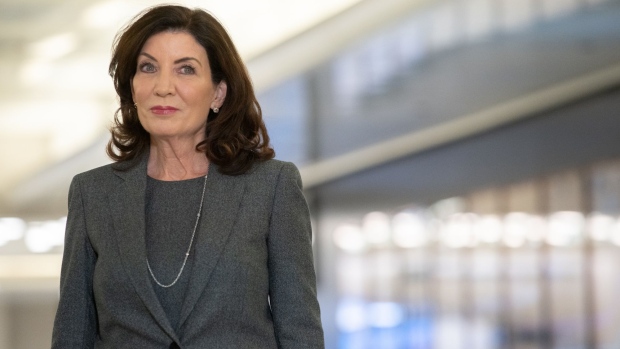Feb 1, 2023
Hochul Wants a Payroll Tax Boost to Fund NYC Subways, Transit
, Bloomberg News

(Bloomberg) -- Governor Kathy Hochul wants to increase a payroll tax on businesses in the New York City area served by the Metropolitan Transportation Authority’s network of subways, buses and commuter rail lines to help fix the transit agency’s operating deficits.
Hochul’s plan, part of her state budget proposal that she released Wednesday, would provide a combined $1.3 billion of new revenue for the MTA each year. The MTA faces a $600 million budget gap this year that’s projected to grow to $3 billion in 2025 as federal pandemic aid runs out.
The MTA, a state agency and the largest US transit system, has struggled to bring riders back as many employees still work from home at least part of the week. High-profile incidents of shootings and riders getting pushed onto the tracks have also kept people off the system. While systemwide ridership has come back steadily to about 60% of 2019 levels, the agency estimates that by the end of 2026 it will reach only 80% of pre-pandemic usage.
“We have to face the harsh reality of MTA’s fiscal cliff, a problem that was created by almost the complete cessation of ridership during the pandemic,” Hochul said during her budget address on Wednesday.
MTA officials have said additional funding from the state and New York City will avoid severe service reductions, layoffs and fare increases above an anticipated 5.5% hike later this year.
NY MTA Approves $19 Billion Budget With Fare Hike, Service Cuts
The MTA anticipates receiving about $1.8 billion of payroll mobility tax revenue in 2023. Increasing the levy to 0.5% from 0.34% would give the transit agency an additional $800 million annually, according to a Hochul spokesperson. The governor is also asking New York City to contribute an additional $500 million.
The plan was reported earlier by the Wall Street Journal.
Hochul wants to raise the payroll mobility tax while also extending an increase on the state’s corporate franchise tax. Lawmakers temporarily boosted that levy to 7.25% from 6.5% on businesses with incomes of more than $5 million. It sunsets at the end of 2023, but the governor is seeking to continue that increase for another three years.
The payroll mobility tax is paid by employers in New York City and its surrounding counties where the MTA provides service, including Westchester County and Long Island.
The governor, a Democrat, also wants to tap potential casino revenue starting in 2026 or later to help direct more money to the MTA. The state began a bidding process last month for up to three casino licenses in the New York City area.
(Updates with Hochul comment in the fourth paragraph.)
©2023 Bloomberg L.P.





